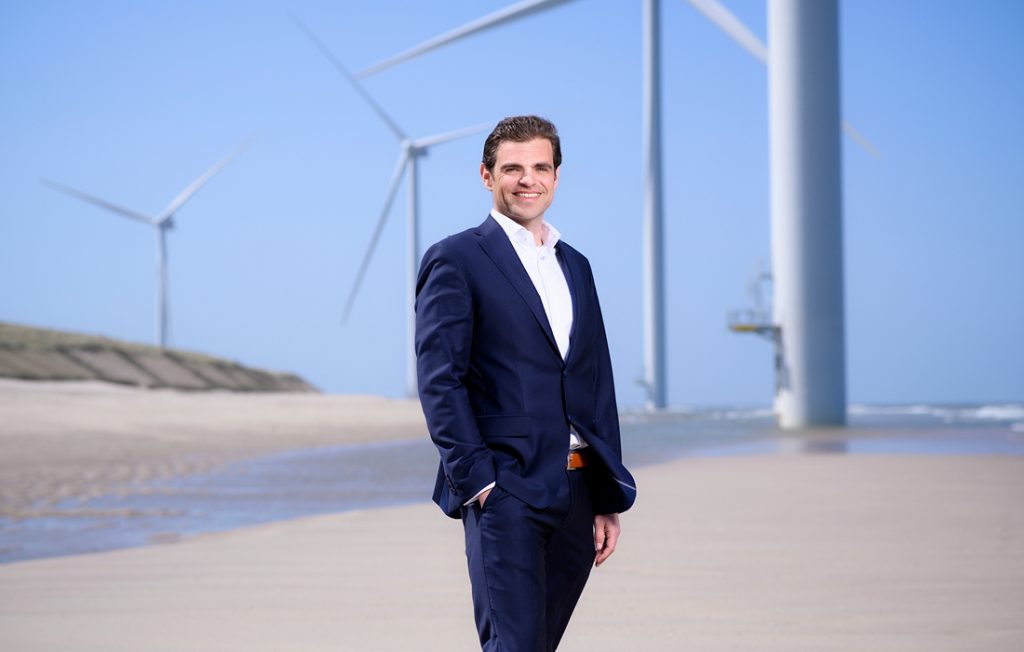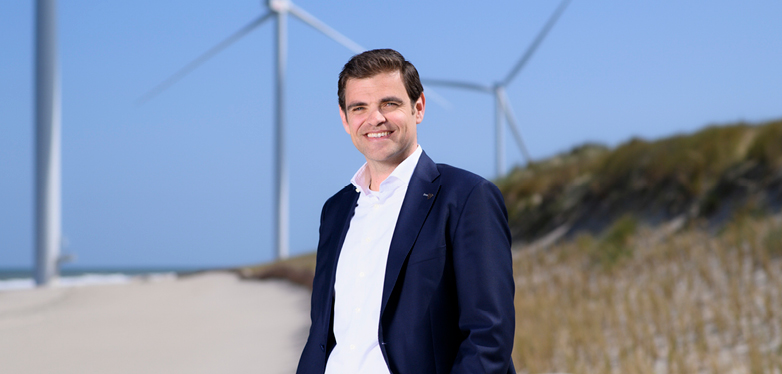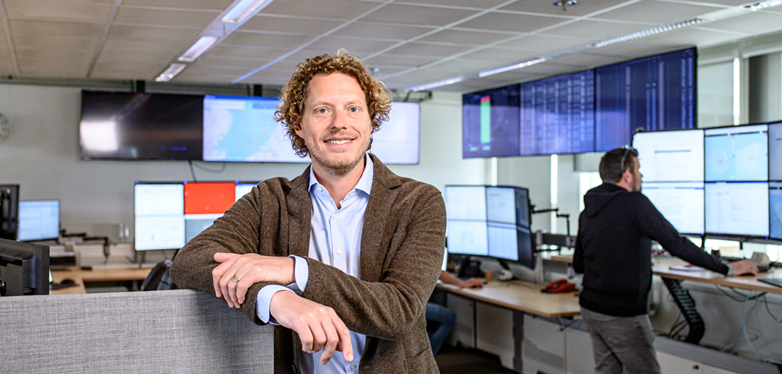
Ecowende: the first ecological offshore wind farm built without government funding
The story of Wijnand de Bruijne
Ecowende, a joint venture of Eneco and Shell, has been granted the tender for the permit to build the Hollandse Kust (west) Site VI Ecowende wind farm. What is special is that this wind farm is largely being built with nature in mind, with ecology forming the most important part of the tender. The wind farm is expected to be commissioned in 2026. How do you approach a tender of this magnitude?
For Eneco’s 2022 annual report, we spoke to an enthusiastic Wijnand de Bruijne, Business Developer for Offshore Wind at Eneco and Deputy Project Director for Ecowende.
Three percent of Dutch electricity demand
‘The new wind energy site is located more than 50 kilometres off the Dutch coast in the vicinity of IJmuiden,’ says Wijnand de Bruijne. ‘The wind farm has a capacity of 756 megawatts and has more than 50 wind turbines. The wind farm will generate enough electricity annually to meet approximately 3% of the Dutch electricity demand – the energy consumption of one million homes – and is being built with no government funding.’
Bid team of more than a hundred specialists
‘A tender like Ecowende is an enormously complex process, one in which, amazingly, more than a hundred specialists participate,’ Wijnand continues. ‘There were contributions from contracting specialists, bid managers and technology and systems integration specialists, as well as ecologists and legal and financial specialists. All workflows were brought together in a clear “bid book”. On the whole, we worked intensively on this for a year, so having been granted this tender is a great reward for all this hard work. All bids received were assessed by the Netherlands Enterprise Agency (RVO) together with an independent expert committee. Of the eight bid competitors, we had the most ecologically innovative plan.’

Wijnand de Bruijne
Ecology is key
‘The bid book was partly based on our experience and knowledge gained during previous tenders for wind farms, for example at the Luchterduinen, Blauwwind and Crosswind wind farms,’ says Wijnand. ‘The document consists of separate documents for technical feasibility, economic feasibility, financial feasibility, on-time delivery feasibility and conformity with the provisions of Dutch legislation on wind farms. But there was also a very important ecological component. The special thing about this component was that it accounted for no less than 50% of all points to be achieved (of the 200 in total). This is because the government attaches great importance to maintaining a healthy ecosystem and biodiversity in the North Sea. This is very important when it comes to Dutch nature. The aim is therefore to build an offshore wind farm with a healthy ecosystem and with as little impact on nature and the environment as possible.’
We aim to build offshore wind farms in the future that have a “net positive impact” on nature.
Net positive impact
Wijnand continues: ‘The starting point for the design and construction is to have as little impact as possible on birds, bats and marine mammals, and even a positive impact on marine life under water. One of the measures being taken is creating a corridor for birds by placing the wind turbines extra far apart. Innovative foundation engineering methods are also being used to minimise the impact on marine mammals and underwater life. By placing natural reef structures on the seabed, this even promotes biodiversity. In addition, Eneco wants to implement and, especially, evaluate dozens of other innovative solutions together with a group of scientists and experts. The aim is to fill in some of the gaps in knowledge about the ecological impact of offshore wind and share this with society and, in particular, with the scientific community. An expert sounding board group has also been set up in this context. In short, Ecowende intends to set a new ecological benchmark for the development and construction of wind farms in the North Sea. We aim to build offshore wind farms in the future that have a “net positive impact” on nature. This is important because there are high ambitions for offshore wind. Acceleration is needed, in a way that contributes to nature and in which the negative effects above water are minimised and a positive contribution is made under water.’
No government funding
‘Because the Dutch government is no longer making grants available for offshore wind farms, Corporate Power Purchase Agreements (C-PPAs) offer the possibility to build them all the same,’ Wijnand continues. ‘Without such long-term agreements there would be no certainty about the price of the electricity generated, and then the financial risks (specifically the market price risk) for energy companies would be too great. In a C-PPA, the parties involved agree on a fixed price per megawatt hour, meaning that the buyer does not have to worry about unexpected price increases over the term of the agreement. The C-PPA thus provides the necessary certainty to both the energy company involved and the banks and investors involved in these types of wind farm projects. KPN is the first customer to register. KPN wants to be climate-neutral in 2030 without the use of offsetting certificates. Their purchase from us makes a significant contribution to this.’
Eneco’s One Planet Plan
Wijnand concludes: ‘Ecowende fits in perfectly with Eneco’s One Planet Plan. After all, if we want to keep our planet habitable for future generations, we must take action now to prevent the earth from warming up by more than 1.5°C. Eneco is assuming its responsibility in this regard. With our One Planet Plan, we aim to be climate-neutral as early as 2035, also for all our customers. Wind energy is an important component in this.’
Key figures
- 760 megawatt hours (MWh) installed capacity
- 3,4 terawatt hours (TWh) & = 3,4 billion kilowatt hours (kWh) power to generate
- 3% Share of the total electricity demand in the Netherlands
Dutch wind energy ambitions for 2030
The Netherlands is lagging behind when it comes to generation and consumption of renewable energy and so C-PPAs are an essential means to ensure the government’s 2030 climate targets are met. All planned offshore wind farms together will provide around 75% of the current electricity demand by around 2030. Currently, approximately 2.5GW of offshore wind energy has been fully commissioned and several wind farms are under construction or have been granted permits. The ‘Offshore Wind Energy 2030’ roadmap describes how and when the designated wind energy sites will be developed in the period between 2024 and 2031. The Dutch government has raised the ambition for offshore wind energy this year to approximately 21GW by around 2030.

Period of turbulence and change
It has been a period of turbulence and change, both for our customers and for ourselves.


